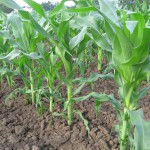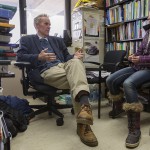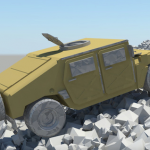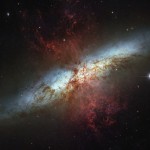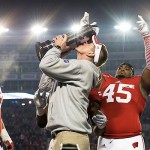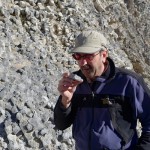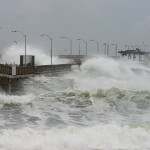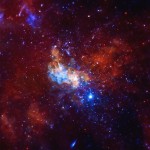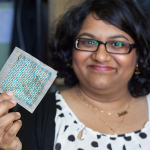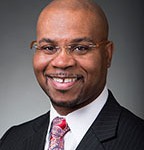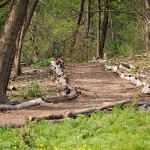Category Employee News
New music performance center named in honor of Hamel family
The University of Wisconsin–Madison announced today that the new music performance center at the corner of Lake Street and University Avenue will be named in honor of Pamela Hamel and UW–Madison alumnus George Hamel.
Collaboration yields new organic sweet corn variety
When the time comes for Wisconsin’s organic farmers to decide which crops to plant next year, they’ll have a tasty new variety of sweet corn — with a particularly sweet name — among their choices. The new variety, called “Who Gets Kissed?,” is the first in a series of organic, open-pollinated sweet corns being developed through a plant-breeding project led by researchers at the University of Wisconsin–Madison and the Organic Seed Alliance (OSA). Farmers and professional breeders are also involved.
Berquam: Campus reflects after Ferguson, Staten Island decisions
Recent grand jury decisions in Ferguson and Staten Island have affected many students here in Madison. No matter what you’re feeling, UW–Madison offers resources to help process what’s going on. Dean of Students Lori Berquam reflects.
New philosophy center to focus on educational policy
The discussion about education is centuries old - and philosophical in nature. From Plato and Aristotle to dozens more in the modern era, philosophers have shaped our earliest ideas about education.
Letting off steam: Gas discharge terminates galaxy’s star formation
With the help of a radio telescope in the French Alps, an international team of astronomers, including two from the University of Wisconsin–Madison, has observed a never-before-seen stage of galactic evolution. Writing in this week’s Nature, a group that includes UW–Madison astronomers Aleks Diamond-Stanic and Christy Tremonti, reports measurements of dense, cold hydrogen gas being blasted from a distant star-forming galaxy, the first direct observation of the “blow out” phase of a galaxy’s evolution.
UW-Madison Holiday Gift Guide
When shopping for those on your holiday list this year, don’t forget the many amazing gifts UW–Madison has to offer. We’ve compiled a list of some of the products available for the holiday season.
Computer equal to or better than humans at cataloging science
In 1997, IBM’s Deep Blue computer beat chess wizard Garry Kasparov. This year, a computer system developed at the University of Wisconsin–Madison equaled or bested scientists at the complex task of extracting data from scientific publications and placing it in a database that catalogs the results of tens of thousands of individual studies.
PHOTOS: Badgers keep axe, advance to Big Ten title game
The battle for Paul Bunyan’s Axe ended in victory for Wisconsin as the Badger football team defeated Minnesota, 34-24 Saturday night at Camp Randall Stadium.
UW team explores large, restless volcanic field in Chile
If Brad Singer knew for sure what was happening three miles under an odd-shaped lake in the Andes, he might be less eager to spend a good part of his career investigating a volcanic field that has erupted 36 times during the last 25,000 years. As he leads a large scientific team exploring a region in the Andes called Laguna del Maule, Singer hopes the area remains quiet.
Study models the past to understand the future of strengthening El Niño
El Niño is not a contemporary phenomenon; it’s long been the Earth’s dominant source of year-to-year climate fluctuation. But as the climate warms and the feedbacks that drive the cycle change, researchers want to know how El Niño will respond. A team of researchers led by the University of Wisconsin’s Zhengyu Liu will publish the latest findings in this quest Nov. 27 in Nature.
Telescopes hint at neutrino beacon at the heart of the Milky Way
Thanks to a confluence of data from a suite of vastly different telescopes, there are tantalizing clues that the massive black hole at the core of the Milky Way may be a cosmic accelerator. In a recent paper published in the journal Physical Review D, a team led by University of Wisconsin–Madison physicist Yang Bai reports a correlation of IceCube data with a recorded burst of X-rays from Sagittarius A, an object at the center of our galaxy that is believed to be a supermassive black hole.
Save power, make power: UW chemist confronts ambitious agenda with a brash laugh
Trisha Andrew, a UW assistant professor of chemistry, holds a solar cell that her research group printed on paper last year. She’s currently…
Nominations invited for vice provost for diversity
A national search is underway to fill the position of vice provost for diversity/chief diversity officer, and members of the campus community are encouraged to submit nominations.
Office of the Vice Chancellor for Research and Graduate Education (VCRGE) New Leadership Structure: Frequently Asked Questions (FAQ)
This FAQ has been developed by the Office of the Vice Chancellor for Research and Graduate Education (VCRGE) to answer questions regarding the reorganization and to provide an update on the progress that has occurred to date.
Decaying trees being removed at Lakeshore Nature Preserve
Crews will begin removing about 80 decaying and dead trees starting this week in the 300-acre Lakeshore Nature Preserve. All trees identified for removal were either already dead or showed signs of significant decline.
Final days draw near for Partners in Giving contributions
Partners in Giving, the state, university and UW Hospitals and Clinics Combined Campaign of Dane County, runs through Nov. 28. Employees have a few more days to contribute toward more than 520 nonprofit organizations and 11 umbrella groups, many of which rely on these funds to meet their needs.
Berquam, Sims: UW offers Ferguson resources
We recognize that today’s grand jury decision about Officer Darren Wilson and the death of Michael Brown will spark a wide range of opinions and emotions in the UW–Madison community. Regardless of your view of the case, we know that it has been a traumatic few months in Ferguson, Missouri, and for many in our own Madison community. We offer our support to all UW students, faculty and staff, as well as those from Missouri.


